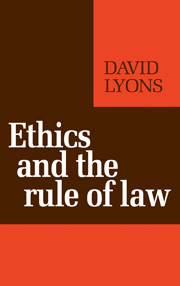Summary
Much of what seems distinctive and is thought valuable about law as we know it concerns procedures. The process of adjudication, for example, is valued as a means of settling disputes in a regular, peaceful manner, according to rules that have already been laid down. Even when established rules are unclear, adjudication, at its best, is thought to serve important values such as rationality, impartiality, fairness, and consistency. So far as legal procedures serve such values, they are often thought of as deserving respect, independently of the outcome of the legal process.
In this chapter we shall complete our survey of issues in normative jurisprudence by examining the values that may be exemplified in legal processes – values that are often thought of as defining “the rule of law.” Then we shall turn, finally, to the idea of obedience to law – another requirement that is associated with the rule of law.
Process values and institutional structures
In an earlier discussion, we took note of the distinction between the justice of laws and the justice of their application. We observed that these appear somewhat independent, since both just and unjust laws can be applied either fairly or unfairly. Our concern was to consider possible connections between the concept of law and justice in the application of the law to particular cases. Our concern now is different: to understand how desirable legal procedures are related to the desirable results or consequences of those procedures.
- Type
- Chapter
- Information
- Ethics and the Rule of Law , pp. 194 - 214Publisher: Cambridge University PressPrint publication year: 1983
- 1
- Cited by



